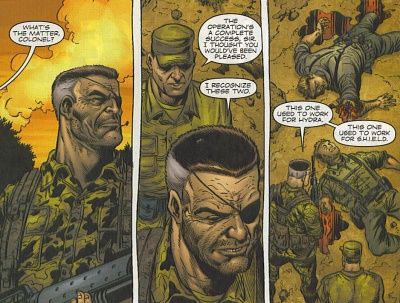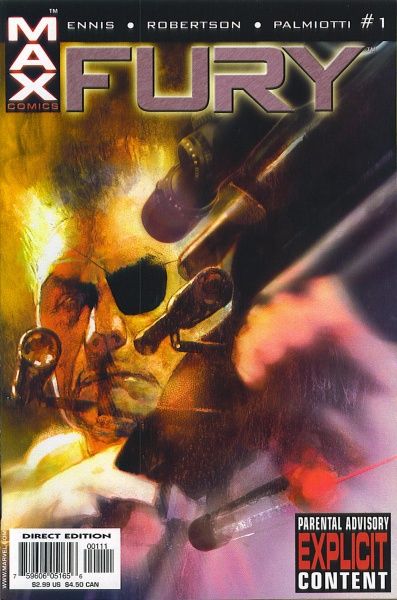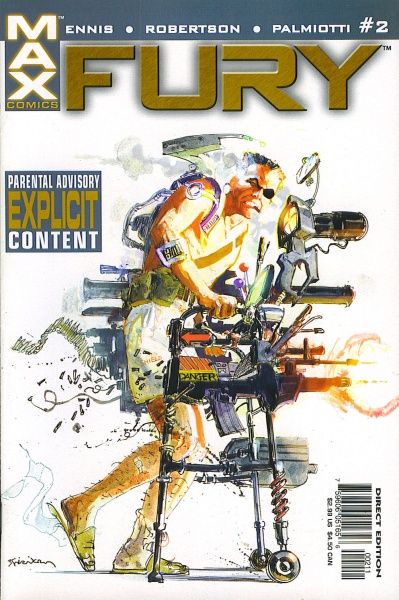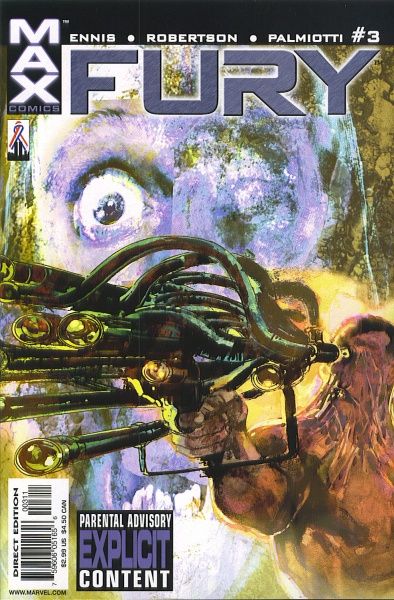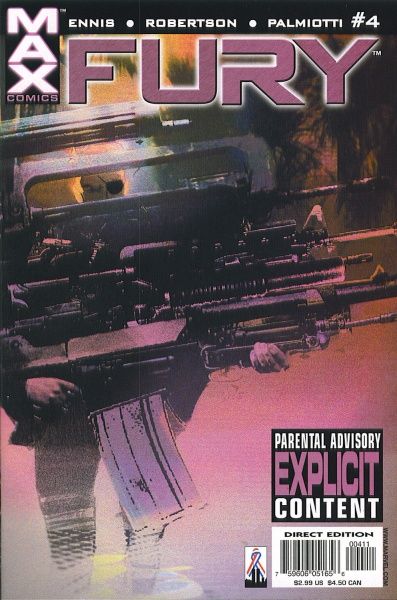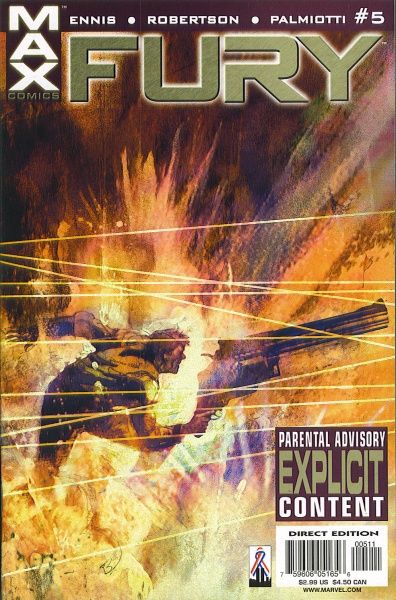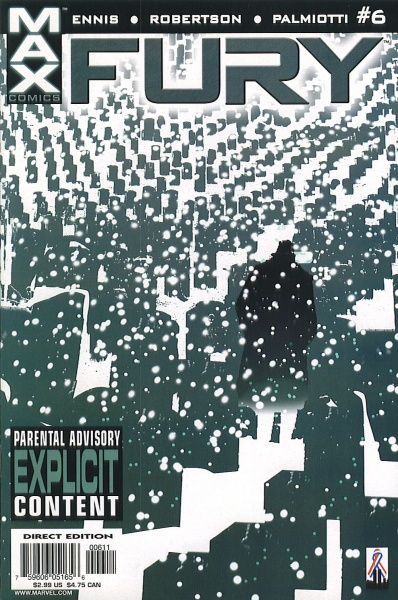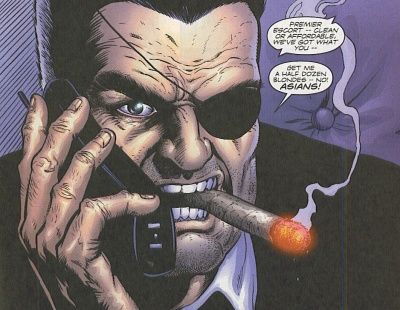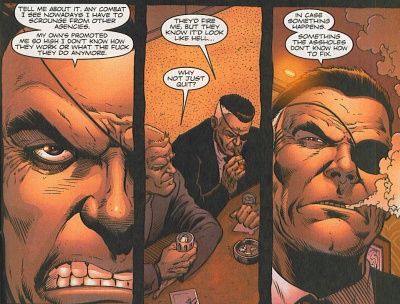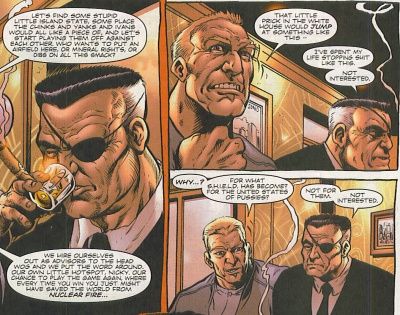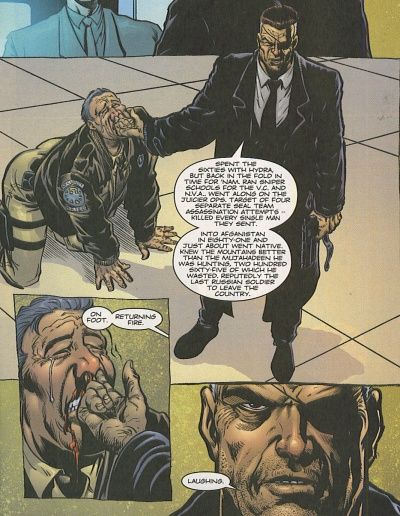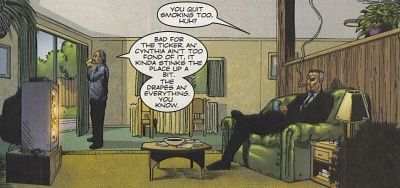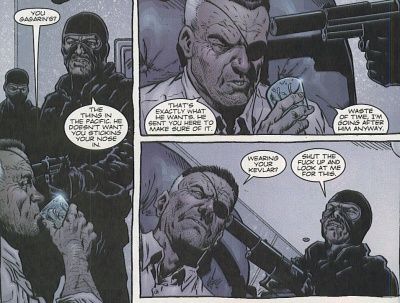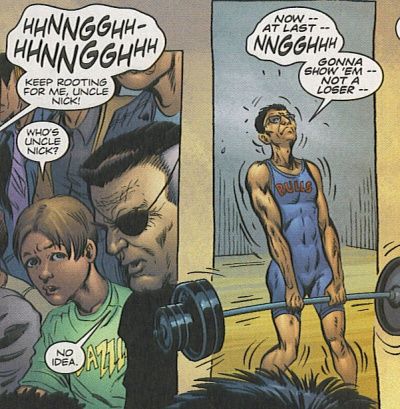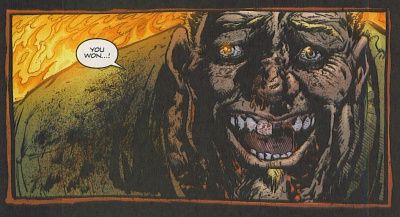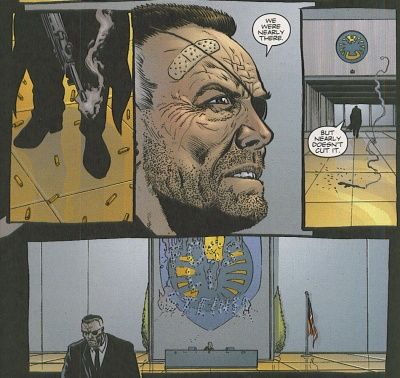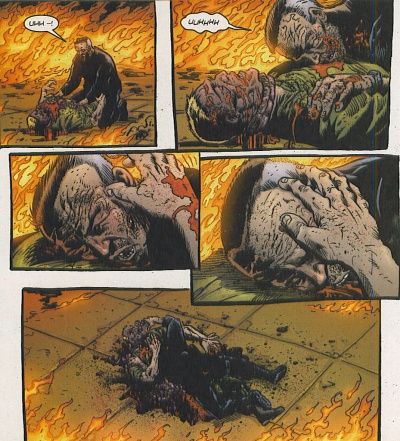Occasionally I don't think I'm going to include a series in Comics You Should Own, because I don't rememberit measuring up to greatness. Then I re-read it. Case in point: Garth Ennis and Darick Robertson's rather odd tribute to everyone favorite's S.H.I.E.L.D. director. I remembering enjoying it when it first came out, but it's a lot better than I thought. Don't believe me? Read on - and remember, I pretty much SPOIL these series in these posts, so don't blame me if I ruin it for you!
Fury by Garth Ennis (writer), Darick Robertson (penciller), and Jimmy Palmiotti (inker), with covers by the master, Bill Sienkiewicz.
Marvel, 6 issues (#1-6), cover dated November 2001-April 2002.
Fury, I would imagine, is one ofthose books that Marvel wishes wouldjust be forgotten. It came out during that brief period of time whenMarvel hired a bunchof really good writers and artists and turned them loose, giving us some excellent comic books thatrelied onprevious "continuity" only whenit suited the situation. If you wanted to write a comic book starring Nick Fury as a bitter old man who likes Asian hookers, gofor it! Then Bill Jemas left the fold, and Marvel reverted, to a large extent, to what theyhad been before. Vestiges of this strangely freeing time at Marvel can still be found - the MAX line has become Ennis's personal playground for Frank Castle,Ed Brubaker is writing mainstream superhero stuff,Powers is actually published byMarvel these days - butit doesn't come close to match what was going on at the House of Ideas at the very beginning of the new millennium. Not all of the books were great, or even good (seriously - The Brotherhood?), but that's not the point. The point is that the creators were allowed to try new things, and that's a recipe for greatness, even if the finished product might not measure up.
Which brings us to Fury, which on the surface is a fairly typical Garth Ennis bloodfest. When you take intoconsideration that Robertson draws this, it's hard not to compare this to The Boys, the latest Ennis-Robertson collaboration. They both feature people doing despicable things to other people. In this series,Nick strangles someone with their own entrails and puts his cigar out in someone else's eye. Charming! Ennis has always been fascinated with coming up with horrific ways to kill people, but in his best work, he tempers it with something else, whether it's humor (Herr Starr's continually awful injuries that turn him into an android) or theological underpinnings (the swath the Devil cuts through John Constantine's friends) orhow friends can make the tragedy bearable (any time someone dies in Hitman). He tempers it in this series, as well, so that even though the violence is horrific, we don't recoil from it because of the point Ennis is trying to make.
Fury is essentially the kind of comic Ennis does remarkably well, which is a war comic. Why it rises above Ennis's other war comics is because in this book, he invents a war, and he doesn't pretend there's anything noble about it. In many of Ennis's war comics, the setting is World War II. The soldiers are fighting Nazis, and that's a good thing, so even though Ennis shows the horror of war, it's still a worthy fight. When he switches sides and focuses on the Germans, he shows that the German soldiers hated the Nazis and were fighting just because it was what they did. Enemy Ace, his two-part story about Hans von Hammer in World War II, is a typical example of this. But that falls short of greatness because it's easy to show a German as anti-Nazi and make him noble. It's far harder to take a standard Marvel hero (and a hero of World War II, to boot) and make him unsympathetic. Yet that's what Ennis does with Nick Fury. And that's why this version of Nick Fury (and we can argue whether he's the "actual" Nick Furyof the Marvel Universe - I say he is)has caused some controversy. It's not the Nick Fury most people want. If we look past the name,though, we'll see a mature, nuanced, and ultimately tragic portrayal of a Cold Warrior who no longer has a war.
Ennis isn't subtle about this, but then, Ennis is rarely subtle. He shows us a Fury completely out of touch with the reality of war in the twenty-first century. What's fascinating about this is that early on, we're rooting for Nick.We begin with Fury, on loan to a DEA operation, overriding the commander's orders and simply going into a drug processing warehouse in the jungle and killing everyone(hedoes leave one guy alive for the DEA to interrogate - he's just swell that way). The next scene has Fury striding through the new S.H.I.E.L.D. building(the Albright Building, a nice touch), which has replaced the helicarrier because of budgetary constraints. This isthe new21st-century S.H.I.E.L.D., and the man running it, Li (who never gets a first name), is a bureaucrat who thinks Fury is an anachronism. This allows Ennis, through Fury, to rant about the country and how soft it's gotten, a theme he explored in Preacher to a certain degree. Later in the issue, Fury meets up with Rudi Gagarin, his old-school Soviet counterpart. Gagarin asks him what's wrong, and Fury says, "What happened to this country? When did the assholes start running things? How did they get away with the pissant little rules they make us live by? Why do they use ten words to hint at what just one would say?I feel like I blinked and someone turned the place into the United States of Pussies ..." They reminisce about the "good old days," when the U. S. ran S.H.I.E.L.D. (even though Fury tries to make the point that it was U. N.-backed, something Gagarin dismisses) and the Soviet Union ran Hydra. Gagarin talks about cool it was, back in the 1960s, when the two of them ran around the world trying to kill each other. He rhapsodizes: "Guys like you and me, battling it out with the fate of the world at stake ... A war in the shadows, a war the little people never knew about ... You set up a government here, knock down a rebel force there ... You convince some generalissimo to invade his neighbors - he thinks it keeps the guns coming in, you know it'll keep coke going out, and all the while you're fucking the idiot's wife ... The whole great game, it - it was like - it was like chess with blood ..." Fury asks him what his point is, and Gagarin tells him they should do it again. Fury tells him he's not interested, and tells Gagarin, "Don't make me come and stop you." Later that night, he listens to a message from his young ward, Wendel, who's in the hospital with a hernia, and this sends him into such a rage that he orders up a dozen Asian hookers. Later, after wearing them out, he stands on his balcony and says, "Christ Almighty ... I want another war." This simple statement shows us that this book might be a bit more than Fury simply stopping the bad guy. And it is.
Gagarin, of course, does what he says he was going to do, taking overNapoleon Island in thePacific Ocean, installing General Makawaoand forcing him to piss off the Americans. Fury discovers this while he's visiting Dum Dum Dugan, who has retired and is living in the suburbs with his wife. This is a crucial scene, as Dugan takes Fury to task for not stopping him before Gagarin took over. Fury, of course,becomes indispensibleto S.H.I.E.L.D. because of Gagarin's action, and he assembles a team to take out the Russian. This allows Ennis to do something he loves and is quite good at: showing "good" soldiers doing their thing and kicking much ass. The shit, as they say, hits the fan. In a big way.
Many of the familiar Ennis themes show up in the fighting on Napoleon Island. There's a great deal of blood, Gagarin has sex with Makawao's daughters, and all kinds of double-crossing and screw-upslead to a fiery apocalypse. Ennis does this kind of thing very well, and this series is no exception. Fury's team, which is made up of Li's brother, a female demolitions specialist, and a New Zealander ex-paratrooper, does their job but all of themget killed, and Fury ends up one-on-one with Gagarin. Robertson, whose art looks strangely like Tom Grummett's in many panels (perhaps the influence of Palmiotti's inks?), does his usual stellar job with the ultra-violence, spraying blood and viscera all over the pages, especially in issue #6. Gagarin's half-amused, half-shocked face when Fury finally guts him is unsettling and fascinating all at once. He says, surprised, "You won ...!" This leads to Fury screaming at him, "Motherfucker! Nobody fucking won!" He then strangles Gagarin with his own intestines, which is a typically excessive Ennis thing to do. It seems like this is a war story the like of which Ennis often does, that despite the heroic way Fury and his team go into the fight, and the tragic way it ends, we think Fury is the kind of warrior Ennis admires - but he's not. And that's why this is a great comic.
Let's go back to the set-up. At the end of the first issue, Fury laments that he wants another war. This comes partly from his brief interaction with Wendel, the son of a soldier who died in Fury's arms who made Nick promise to care for him. We'll get back to Wendel. After this short outburst, Fury visits Dugan, and finds him married and happy. Fury can't believe it - Dugan says Fury is bored and wants to go back to shooting people, and Fury says, "Don't try to pretend you're any different. And don't make it out to be something shitty; we did a lot of good shooting the people we shot. This living in Westchester like a monk and going to meetings - this isn't you, any more than driving a desk and swallowing bureaucratic bullshit is me ..." Dugan says it is him, because he didn't fight wars so people could make new ones. He says that fighting isn't a natural way to be, and that Fury should enjoy the peace he spent all the years fighting for. Then, when they see on the television that Gagarin has taken over on Napoleon Island, Dugan calls him out for not stopping him. Coming on the heels of what Dugan has already said, it sets up the rest of the story. Why didn't Fury stop him?
For the rest of the issue and for most of the rest of the series, Fury is in his element. He heads back to S.H.I.E.L.D. and tells Li that the bureaucrats need him now. Later, Gagarin sends an assassination squad to kill Fury, but Nick knows that Gagarin is just testing him, and he kills all five of the assassins. This is another crucial scene, as Fury revels in his abilities, and the final page of the issue, with Fury smoking a cigar, holding a gun, and covered with blood, is another clue that Fury himself wants this. "It's on," he says, and we can almost hear the savage glee in his voice.
In issue #4, Ennis uses some misdirection to keep us from thinking of Fury as a bastard. Steiner, the female demolitions specialist, asks Fury why he hasn't expressed much confidence in the United Nations even though the mission is backed by the U. N. Fury launches into a rant: "The U. N. are a bunch of fuck-ups, but they still beat the shit out of the C. I. A. The last thing I want is to leave this place in the hands of those bastards. ... And the smaller the role American forces play in toppling the Makawao regime, the less excuse the U. S. has to get a toehold afterwards. I'd rather have U. N. peacekeepers here than some company-backed fucker a thousand times worse than Makawao. So would the islanders, believe me." Later in the issue, the team sees a group of natives pushing a jeep across a river. Fury tells Steiner, "Those are the people that always get fucked. Doesn't matter where you are in the world, or who's in charge of the place, or who's backing them up, the little people always get shit on. And the ultimate point of what we do is supposed to be to change that. The United Nations and its relief agencies are stupid and corrupt, but sometimes - only sometimes - you can use them to do some good. You can unfuck life for a few people, if only for a little while." This seems to show how much Fury really cares about the people, which is what Ennis wants us to think. But then there's Wendel. Fury's ward is, according to the man himself, a "retard." That's Fury talking, of course, and there's no indication that Wendel is anything but an enthusiastic worshipper of his cool "uncle" Nick. Wendel shows up in the first two issues, and in the second issue, Fury is pushing him around the zoo in his wheelchair after Wendel's hernia in the first issue. Fury fantasizes about pushing Wendel into the tiger pit, where he's chomped to bits. As the tigers eat him, he continually smiles at Fury and tells him his problems are over: "I'm out of your life! The terrible albatross that's been slung around you neck for so long is gone!" He also tells him that S.H.I.E.L.D. wants him back in charge, and he'll "be able to go all over the world and shoot whoever you want, just like the old days ..." When Fury is confronted by "the little people [who] always get shit on," he loathes it. His speeches to Steiner hide the fact that he thrives on what Gagarin has done. Only Gagarin is willing to admit it, though.
We see this, finally, inissue #6. Fury haskilledGagarin and returned to New York, where he discovers that Li hasturned Napoleon Island over to the United States, the exact situation Fury wanted to avoid. Nick takes a really big gun and, Rambo-style, blasts the S.H.I.E.L.D. symbol in the front of the building. Then he goes home, wherehe listens to a voice message from Dugan: "Was it worth it, you stupid fucking bastard?" As he stands on his balcony, he remembers what Gagarin said to him, moments before Fury killed him: "If I hadn't come down here and started this, you would have done it yourself." On the battlefield, Fury shrieked "bullshit," but on his balcony, when he thinks about it, he admits the truth. We leave him, a broken, battered man, with nothing left but the endless war. It's a horrifying portrayal of a long-time Marvel character, and makes this war story far more interesting than most of those by Ennis.
It's also why Marvel wishes this book would go away, and why this book was controversial. Many people, I remember, claimed this wasn't the actual Nick Fury that Steranko made famous. The theory was that Marvel now had at least three "Nick Furys" - the regular Marvel U. guy, the Ultimate line guy, and this one. However, the MAX comics were never "outside" of Marvel continuity - Jessica Jones is firmly cemented in the Marvel U., and I think the fact that thisis the Nick Fury we've known and loved makes this comic even more powerful. If you have never read a Marvel comic before, this series works because of the way Ennis presents the characters and gets us up to speed. If you're along-time fan of Marvel, however, realizing that the S.H.I.E.L.D. director who is a certified Marvel hero has become this burned-out, bitter old soldier who can't adjust to the real world is a jarring awakening. Without making a big deal about the "real-world" implications of a superhero world, like Civil War did unsubtly, Ennis takes a fictional and somewhat flamboyant soldier/spy and makes some trenchant points about soldiers in general. How can they adjust if all they've ever known is blood and death? Dugan seems to have adjusted quite well, but Ennis makes it clear that it took a lot of work on his part and on the part of his wife. Fury doesn't have that support, and he can't understand that it's not the world that's messed up, but him. Yes, he makes some good points about how S.H.I.E.L.D. has become a bureaucratic nightmare, but as Li tells him early on in issue #1, "The shadows have never looked brighter." Fury has won a war, and not unlike the country he serves, he finds himself without a purpose. He defines himself by his mission, and once that is taken away, he no longer has an identity. Gagarin makes the point about how good the Cold War was for them. Ennis is making a subtle point about the United States in general - the Cold War gave us an enemy, both in the form of a superpower - the Soviet Union - and an ideology - communism. Once that was taken away, the U. S. lost its identity, and struggled to find itself. Much, if not all, of this comic was written before September 11, but Ennis seems to be making the point that The Global War On Terrorâ„¢ was a godsend to a country that needs to define itself by its enemies. I'm sure I'm reading too much into this, but it's certainly something to think about. Fury is a Cold Warrior who wants another war so he can feel good about himself. Is that too different from several people in the United States government? Fury's final, choked, "Oh God" is an acknowledgement that he has become something he claims to hate. At least Gagarin is honest with himself as he dies with his teeth smashed and his intestines wrapped around his neck. As he dies, he clutches Fury in an embrace, and Robertson gives us a horrid and tragic panel of the two of them, one dead, and the other soulless. It's a powerful image.
Fury has been collected in trade, and it's fairly easy to find. It's a disturbing book to read, but it shows why Ennis can be such a brilliant writer even as he's indulging in his trademark over-the-top gross-out antics (I haven't even mentioned the disfigured soldier, whom Gagarin says is far more hard-core than some American boy who shot his face off - a nice reference to Arseface in Preacher). The series is far deeper than people gave it credit for, and it's a portrait of a Marvel hero that we rarely see. Which, of course, is why Marvel doesn't want anyone to remember this series. But we should!
I know the archive is incomplete (I'm working on it!), but if you're interested, check it out.

